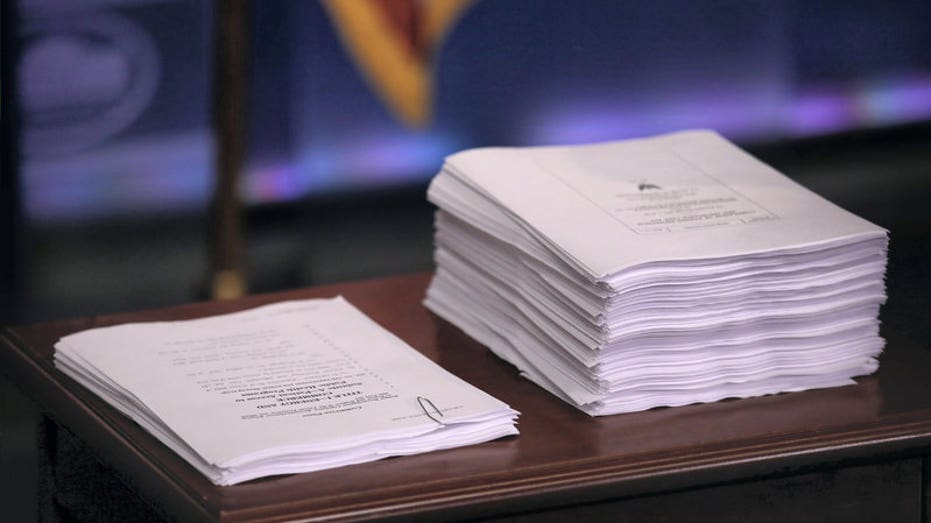Private insurance enrollment in this state decreased by 14,000 after Medicaid expansion
If every state were to take on Medicaid expansion, 2 million able-bodied Americans could ditch their private insurance plans for federal coverage, a new study shows
Private insurance enrollment in Idaho decreased by 14,000 since last year after Medicaid expansion, state insurance exchange Your Health Idaho said Wednesday.
The announcement came as more and more states launch Medicaid expansion under the Affordable Care Act (ACA), or ObamaCare. Kansas became the 38th state, including Washington, D.C., to expand Medicaid under ACA on Thursday.
Foundation for Government Accountability (FGA) Research Director Nic Horton and Policy Director Sam Adolphsen, who conducted a study on how Medicaid expansion is affecting the U.S., told FOX Business that supporters of Medicaid expansion will argue that 14,000 adults in Idaho who were uninsured now have insurance, but the majority of people who had private insurance are increasingly choosing Medicaid if they don't want to pay high out-of-pocket costs.
Your Health Idaho Executive Director Pat Kelly said a decrease in enrollments after Medicaid was expected in a Wednesday statement.
"We always knew Medicaid expansion was a possibility, and that as a result, enrollments on the exchange would be impacted," Your Health Idaho Executive Director Pat Kelly said in a statement. "We’ve planned for this change and do not expect to see any material adjustments to our long-term sustainability."
If every state were to take on Medicaid expansion, 2 million able-bodied Americans could ditch their private insurance plans for federal coverage, a new study shows.
MORE PEOPLE SIGNING UP FOR HEALTH INSURANCE IN CALIFORNIA
States across the country have signed up twice as many able-bodied adults for the program than anticipated, and the price of Medicaid per individual was also twice as high as expected, leading to significant cost overturns, according to research by the Foundation for Government Accountability (FGA).

Xonjenese Jacobs, right, helps Kristen Niemi sign up for the Affordable Care Act during a health care expo at the University of South Florida Tuesday, Jan. 24, 2017, in Tampa, Fla. (AP Photo/Chris O'Meara)
Horton and Adolphsen said the research shows a quiet shift to Medicare for All throughout the U.S., which will come at the expense of taxpayers.
Montana has experienced a 74 percent drop in private insurance enrollments after it expanded Medicaid in 2016. Louisiana has also experienced an 80 percent drop since it launched Medicaid expansion in 2016, the study shows.
CALIFORNIA MADE $71M WORTH OF UNALLOWABLE MEDICAID PAYMENTS TO DEAD PEOPLE
And while the number of people without insurance did not decrease, the number of people with private insurance dropped significantly, the study found. In Arizona, for example, after 10 years of expanded Medicaid, Medicaid enrollments increased by 6 percent and private insurance enrollments decreased by six percent. The same phenomenon happened in Maine over a 10-year period.
The study also found that the majority of people -- 54 percent and as much as 71 percent in some states -- who enrolled in Medicaid under expansion already had private insurance. If the remaining states that have not yet expanded Medicaid decided to do so, an estimated 2 million able-bodied Americans would be forced off private insurance.

A copy of ObamaCare repeal and replace recommendations (left) produced by Republicans in the U.S. House of Representatives sits next to a copy of the Affordable Care Act known as ObamaCare. (REUTERS/Carlos Barria)
Out of nearly 2.4 million individuals with incomes between 100 and 150 percent below the federal poverty line (FPL) who receive premium federal subsidies in states that have not expanded Medicaid, 85 percent have an income 138 percent below the FPL, which is the eligibility line for Medicaid.
GET FOX BUSINESS ON THE GO BY CLICKING HERE
If Medicaid expansion were to come to these enrollees' states, however, they would lose those subsidies because only those with incomes that are more than 138 FPL -- 15 percent -- can qualify for subsidies under Medicaid expansion. More than 2 million Americans who are eligible for Medicaid subsidies in states without expansion would enroll in Medicaid if their states were to expand ACA, according to the study.
"Ultimately," FGA noted, "ObamaCare's Medicaid expansion means taking aware resources from the truly needy to fund welfare expansion for those who already have private coverage."
CLICK HERE TO READ MORE ON FOX BUSINESS
This article has been updated to include comments from Horton and Adolphsen.




















